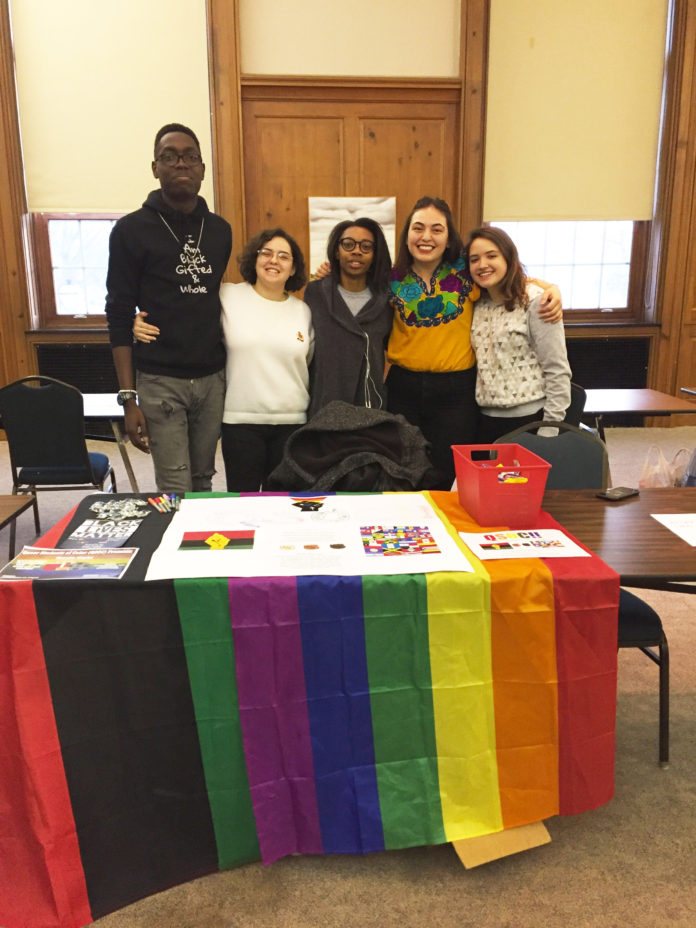
Founded this semester, the “Queer Students of Color” (QSOC) organization reaches out to members of their own community on campus and fosters an environment of education and inclusion.
Senior Jacqueline Rueda founded the organization in order “to advocate, to educate, and to have fun, to be a community.” She wanted to share a space in which queer students of color could feel comfortable.
“The purpose of QSOC is to highlight and have conversations about queer people of color and validate their experiences, and talk about the issues that we go through that the white LGBT community does not understand or does not validate,” Rueda said.
Caesar Tobar-Acosta, a junior who serves as the Vice President of the organization, spoke about the dual benefits of the organization. “It benefits two different communities,” Tobar-Acosta said. “It benefits the people that identify as a queer student of color because it helps build a community that goes through the same struggles, but it benefits anyone who isn’t because of the open events that we have that are to educate people on a wide variety of topics.”
QSOC highlights the intersectionalities of students on campus. “One of the big things about identity is that you have to remember that it’s very intersectional,” Tobar-Acosta said. “So, while you may have other organizations that are very strong on queer identity, it is still generally a very homogenous identity.”
When Rueda pitched the idea of QSOC to administrators, some insisted that DePauw already had an LGBT organization in United DePauw. But Rueda wanted to share a space where students could find a home without sacrificing their identities.
“I’m glad that there’s United DePauw for those students who feel like United DePauw is their home, but it’s not my home. So I’m going to create my own home and share that space with other people,” Rueda said.
First-year Kaleb Anderson, QSOC’s public relations executive, also highlighted the need for queer students of color to have their own space. “When I went to a few United DePauw meetings, I felt that my intersectionality wasn’t being covered in that space,” Anderson said. “Anything that happens within the gay community as a whole, we’re not the faces of that community.”
Rueda emphasized the importance of having diverse and intersectional student organizations on campus. “It’s essential because as students here, as leaders on campus, we should have the right to bring whatever we feel like is needed for ourselves and for other generations,” Rueda said. “It’s important because we need to embrace each other, to understand each other, and to educate each other because if we don’t, then we’re invalidating other people.”
Anderson stressed that QSOC is open to more than just queer students of color. “A lot of times with our student orgs on campus, a lot of people get afraid of coming to other organization’s meetings and events just because they don’t want to feel intimidated in a space and they don’t want to feel like they’re not welcome in a space,” Anderson said.
The group does have closed meetings that are reserved specifically for queer students of color, “but largely a lot of our meetings are open… our spaces are open,” Anderson said.
Though the group has received some positive feedback from the greater DePauw community thus far, they still wish to increase their impact on campus and to reach out to more students. According to Tobar-Acosta, the group has “had some people outside of our community, but most of our open meetings are still students of color with all different genders and sexual orientations. We haven’t had much white student feedback.”
Anderson suggested that making DePauw a more welcoming community to students of marginalized identities happens by individuals putting themselves in uncomfortable spaces and being willing to discuss uncomfortable topics. “I think that all the time, students of color feel uncomfortable, everywhere,” Anderson said.
He emphasized that inclusion requires self education. “A lot of what DePauw is about is having these uncomfortable conversations with people,” Anderson said, “and in order for white queer students to understand queer students of color and the plight that we go through, it’s going to take being uncomfortable in each other’s spaces.”
Anderson expressed the need for DePauw administration to be open to the needs of students. “The more we as students are fighting and being direct with the administration about our needs and concerns, and putting ourselves in leadership positions like we are, I think that DePauw can continue to try and cultivate this environment that’s inclusive of us too,” Anderson said.
Rueda echoed this sentiment, emphasizing the importance of building diverse communities. “I think that a lot of times, there’s this pressure of just being one, when in reality we can’t just be one. We have to be a community with different communities,” Rueda said. “We have to embrace all of who we are without putting it under one group, being more open to what students need.”
Rueda founded QSOC in order to appreciate the intersectionality of her identities.
Overall, she believes that the DePauw community should focus on making sure spaces do not make individuals feel like they have to erase their other identity. “People say that [QSOC]’s dividing, but people need to see that it’s not a division; it’s a bridge,” Ruenda said. “It’s to build bridges and to come together and embrace differences, validating multiculturalism and our intersectional identities.”


